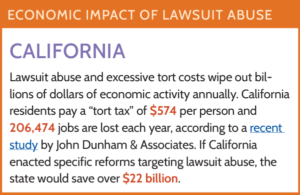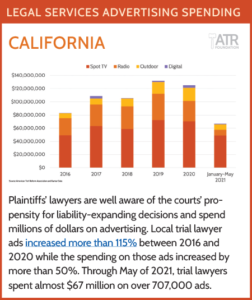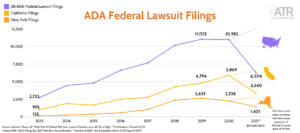PROP-65 LITIGATION ON THE RISE AS BOUNTY HUNTER PLAINTIFFS TARGET BUSINESSES ACROSS THE STATE
Proposition 65, the originally well-intentioned law enacted in 1986, is one of the plaintiffs’ bar’s favorite tools to exploit. Baseless Prop-65 litigation unjustly burdens companies that do business in California.
The money companies spend on compliance and litigation unnecessarily drives up the cost of goods for California consumers. Prop-65 subjects consumers to ridiculous warnings declaring that most everything causes cancer. It also harms small businesses that do not have the in-house expertise or means to add the necessary warnings or handle litigation.
Under Prop-65, businesses are required to place ominous warning signs on products when tests reveal the presence of even the slightest, non-threatening trace of more than 1,000 listed chemicals that state environmental regulators deem carcinogenic or otherwise toxic. Failure to comply can cost up to $2,500 per day in fines, and settlements can cost $60,000 to $80,000.
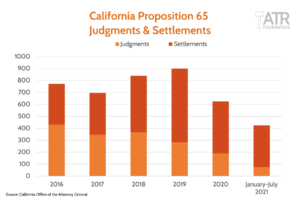
A troublesome part of the law allows private citizens, advocacy groups and attorneys to sue on behalf of the state and collect a portion of the monetary penalties and settlements, creating an incentive for the plaintiffs’ bar to pursue these types of lawsuits. Each year, they send thousands of notices to companies threatening Prop-65 litigation and demanding a settlement. Food and beverage companies are among the prime targets. In fact, California saw a shocking rise in Prop 65 pre-litigation notices to the food and beverage industry in 2020, jumping from 534 in 2019 to 1,546 in 2020. As of November 2021, plaintiffs’ lawyers had sent more than 2,600 litigation notices to businesses across the state.
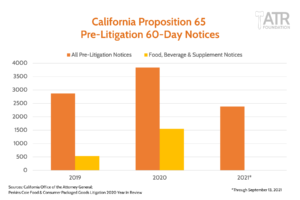
This activity is primarily driven by several new, aggressive bounty hunter plaintiffs who are searching for payouts despite not suffering any injuries. A vast majority of the notices claim that plaintiffs’ lawyers or advocacy groups detected traces of acrylamide, lead, and cadmium in products, accounting for more than 85% of all notices received by food, beverage and supplement companies.
According to the California Attorney General’s office, businesses settled 435 Prop-65 claims in 2020 totaling $9.3 million. About 86% of that amount, more than $8 million, went to plaintiffs’ attorneys. There were also 191 judgments in 2020 totaling $10.7 million, with $7.2 million (67%) going to plaintiffs’ attorneys.
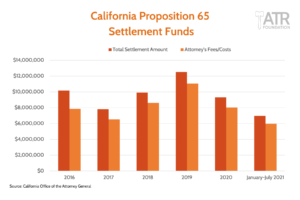
Through October 2021, Prop 65 activity has already exceeded the prior year. As of November 15, 2021, businesses have spent almost $11.5 million to settle 556 Prop 65 claims. As in 2020, 86% of that amount, $9.9 million, has gone to plaintiffs’ attorneys. In addition, there have been 138 Prop-65 judgments in 2021 totaling almost $9.8 million, with $5.9 million of this sum (60%) going to attorneys.
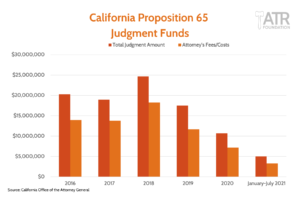
Glyphosate
The most infamous Prop-65 case involves Bayer’s Roundup® products. California added the popular weed killer’s active ingredient, glyphosate, to the Prop-65 listing in July 2017. Regulators and scientists worldwide have deemed glyphosate safe, except for the International Agency for Research on Cancer (IARC), whose study was riddled with controversy. The single IARC report stating glyphosate is carcinogenic is in stark contrast to more than 800 studies submitted to the U.S. Environmental Protection Agency (EPA).
In June 2020, a federal judge pushed back against California’s baseless warning requirement and that decision is now on appeal to the Ninth Circuit Court of Appeals. Federal Judge William Shubb ruled that California cannot require Bayer AG to label its glyphosate-based weedkiller Roundup® as “known to the state of California to cause cancer.” Judge Shubb stated “Notwithstanding the IARC’s determination that glyphosate is a ‘probable carcinogen,’ the statement that glyphosate is ‘known to the state of California to cause cancer’ is misleading. Every regulator of which the court is aware, with the sole exception of the IARC, has found that glyphosate does not cause cancer or that there is insufficient evidence to show that it does.”
The U.S. Chamber of Commerce, California Farm Bureau Federation and others are urging the Ninth Circuit to uphold the lower court’s decision. The groups argue that ordering companies to carry “subjective and stigmatizing speech” violates First Amendment rights. The California Farm Bureau Federation observed that the availability of glyphosate is critical to the agricultural industry, not only allowing farmers to improve crop yields, but also to protect the environment. The U.S. Chamber pointed to the “highly misleading” and “heavily debated” nature of California’s mandated warnings.
The EPA also has explicitly challenged California’s designation of glyphosate as a carcinogen. The federal agency told all glyphosate registrants to remove Prop-65 warnings because the language (stating that glyphosate is carcinogenic) constitutes a false and misleading statement that violates the Federal Insecticide, Fungicide, and Rodenticide Act’s prohibition against misbranded substances.
Glyphosate Personal Injury Cases
Unfortunately, California courts rely more on plaintiffs’ attorneys than scientific experts when making these important determinations. In May 2021, a Ninth Circuit judge affirmed a $25 million verdict involving glyphosate warnings on Roundup®. The judge rejected Monsanto’s argument that federal law preempts the state law claim because the EPA had approved Roundup’s label. While many states recognize a defense based on compliance with federal standards, California does not. The court held that the EPA’s standards and instructions do not preempt state law because the EPA’s approval of the Roundup® labels do not carry the force of law, a requirement for federal preemption.
This case is on appeal to the U.S. Supreme Court. Bayer claims that the Ninth Circuit’s errors will allow companies to be severely punished for not including cancer warnings on products, even when near- universal scientific and regulatory consensus is that the product does not cause cancer. The responsible federal agency, the EPA, has forbidden such warnings for Roundup’s active ingredient, glyphosate. The Ninth Circuit’s decision would allow a company to be punished under state law for not including a label that is disallowed by federal regulators.
In August 2021, a California appellate court affirmed a trial court’s $87 million award for a couple’s claim that exposure to glyphosate gave them non-Hodgkin’s lymphoma. The lawsuit consisted of design defect and failure to warn claims under California state law, with the court again rejecting Bayer’s argument that the claims are preempted by federal law. In November 2021, the California Supreme Court denied Bayer’s request to hear the case leaving the massive verdict intact.
While California has hosted multi-million glyphosate verdicts, juries are not always willing to overlook science and pin the blame on a business for the tragedy of a person’s cancer diagnosis. In October 2021, for example, a Los Angeles jury found that the plaintiff’s family’s use of Roundup® in their yard and his school’s use of the product in its fields was not the cause of his lymphoma.
Settlement Discussions
On May 26, 2021, U.S. District Judge Vince Chhabria refused to approve a $2 billion class action settlement to cover future claims that Roundup® caused cancer because it would do little to help class members.
The $2 billion settlement would have provided up to $200,000 for each class member who was exposed to Roundup® and later was diagnosed with non-Hodgkin’s lymphoma. It would have allocated $50 million to a fund for “extraordinary” cases allowing individuals to be compensated more than $200,000.
The proposed settlement of future claims followed a separate $9.6 billion settlement by Bayer in 2020 for current Roundup® claims.
Acrylamide
California businesses are fighting back against another Prop-65 labeling requirement for products that contain Acrylamide. Acrylamide is a chemical that can form in some foods during high-temperature cooking processes, such as frying, roasting, and baking. The chemical was added to the Prop-65 list in 1990 as a carcinogen and in 2011 as “causing reproductive and developmental effects.”
In March 2021, a California federal court granted a motion for preliminary injunction barring the Attorney General and anyone else from filing new lawsuits against businesses for not displaying Acrylamide warnings. In California Chamber of Commerce v. Becerra, U.S. District Judge Kimberly Mueller ruled that the State failed to show that the required cancer warnings are purely factual and uncontroversial. It also failed to show that Prop-65 imposes no undue burden on businesses that would have to provide the warnings. The judge said that the acrylamide warning requirement “is controversial because it elevates one side of an unresolved scientific debate” about whether consuming foods and drinks with acrylamide causes cancer. This decision is on appeal to the Ninth Circuit.
Following this decision, the Council for Education and Research on Toxins (CERT) appealed the preliminary injunction order and moved for an emergency stay, which the court granted to the extent that it bars any private enforcer from bringing new Prop-65 acrylamide actions.
In an interesting turn of events, Judge Mueller recused herself in September from the lawsuit at the urging of two advocacy groups that intervened in the case. The documents in the motion remain sealed but seem to argue that Judge Mueller has an interest in the outcome of the case based on her husband’s business interests. While stating that there is nothing requiring her recusal and she has no bias or prejudice, Judge Mueller indicated that she felt pressured by the “uncommonly aggressive, scorched earth efforts” of the advocacy groups, which included extensive personal details about the judge and her husband in their motion that have little relevance to the case. Judge Mueller indicated that she believes the recusal motion was not motivated by a fear of bias, but likely was spurred by the belief that the organizations would have a better chance of success before another judge.
 After a two-year hiatus, the “Golden State” has once again reclaimed its spot atop the Judicial Hellholes® list. While the state’s demotion was due to the plethora of issues that faced former-Number 1, the Philadelphia Court of Common Pleas and the Supreme Court of Pennsylvania, and not a result of reform; this year it is too hard to ignore the significant lawsuit abuse and liability-expansion occurring in California.
After a two-year hiatus, the “Golden State” has once again reclaimed its spot atop the Judicial Hellholes® list. While the state’s demotion was due to the plethora of issues that faced former-Number 1, the Philadelphia Court of Common Pleas and the Supreme Court of Pennsylvania, and not a result of reform; this year it is too hard to ignore the significant lawsuit abuse and liability-expansion occurring in California.